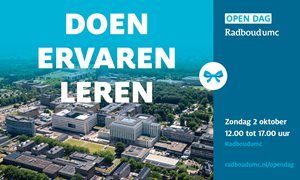 Researchers at Radboud university medical center and Leiden University Medical Center (LUMC) have been given the green light to deliberately infect volunteers with malaria in order to test a highly promising vaccine on them.
Researchers at Radboud university medical center and Leiden University Medical Center (LUMC) have been given the green light to deliberately infect volunteers with malaria in order to test a highly promising vaccine on them.
“‘That’s terrible. Who does that?’ That is often how people respond when I tell them about our research,” says Meta Roestenberg, researcher at the Department of Parasitology and Infectious Diseases at LUMC. “It gets stressful, but it may also be a huge step forward,” says Jona Walk, doctor and researcher at the Department of Medical Microbiology at Radboud university medical center. Together, Radboud university medical center and LUMC are going to test a promising malaria vaccine by utilizing controlled human infections, a method in which healthy, volunteer test subjects are deliberately infected with the disease in order to test the vaccine quickly and cheaply.
Green light
“We had already received a permit from the government, but last month, we also received permission from the Central Committee for Research Involving Human Subjects (Dutch: CCMO), so we were able to begin our research,” says Roestenberg. “We are still waiting on FDA approval from the US, where the vaccine is produced,” adds Walk. According to plan, the researchers will be able to begin recruiting healthy test subjects in the spring of 2017.
Weakened, live parasites as a vaccine
For years, the research groups at Radboud university medical center and LUMC have been working on this vaccine in which a weakened form of the malaria parasite is administered. During animal testing, researchers showed that the vaccine provided animals with safe, complete protection. “That is very promising, since the malaria vaccine which is currently available only provides limited, temporary protection. A vaccine that offers complete protection can prevent half a million deaths each year,” says Walk.
Getting bitten by mosquitoes
The testing of the vaccine consists of two phases. “During the safe phase, we make sure that the weakened parasites in the vaccine do not cause malaria in the test subjects,” explains Roestenberg. “We start with a low dosage and, if no problems occur, we inject the next test subject with a higher dosage.” If the results of the first phase are good, the second phase of the research will begin, during which it will be observed whether the vaccine provides the proper protection. The vaccinated subjects are infected with malaria by mosquitoes carrying the disease, which have been bred in the Nijmegen laboratory. The test subjects are closely monitored and receive complete and immediate curative medicine if malaria is detected.
Update
In the research that will take place this year, the vaccine will only be tested in the Netherlands. If the research results show that the vaccine works well, the two university medical centers will continue testing in Africa.
Related news items

Joint research in regional hospitals New research projects from promotion fund
22 November 2022Four research projects have been honored in the promotion fund of the Radboudumc and four regional hospitals. The research projects, which are a collaboration between CWZ, Jeroen Bosch Hospital, Rijnstate, Sint Maartenskliniek and the Radboudumc will receive a contribution of 240,000 euros.
go to page
L’Oréal-Unesco For Women in Science grants now open to researchers in Life Sciences and STEM disciplines
8 November 2022The eleventh call for applications of the Dutch L’Oréal-Unesco For Women in Science fellowships opens on 16 January 2023. But this year, it’s a little different: next to researchers in Life Sciences, women working in the STEM disciplines can also apply.
go to page
Take a special look inside Radboudumc on 2 October Open Day for young and old
12 September 2022On Saturday 1 and Sunday 2 October, the Radboud university medical center, Radboud University and the HAN are participating in the 'Weekend van de Wetenschap'. At all locations there are fun and interesting programs for young and old.
go to page
Grants for heart and kidney research Two awards to Radboudumc in Open Competition ENW-XS
21 July 2022Two researchers from the Radboudumc receive a grant from the NWO within the Open Competition of the Exact and Natural Sciences. They are Thijs Eijsvogels, who studies the heart, and Pieter Leermakers, who studies the kidneys.
go to page
Course on entrepreneurship for PhD candidates and postdocs
19 July 2022Are you thinking about what to do after your PhD? Want to know more about entrepreneurship? This course gives you insight in many aspects of entrepreneurship and research in industry.
go to page